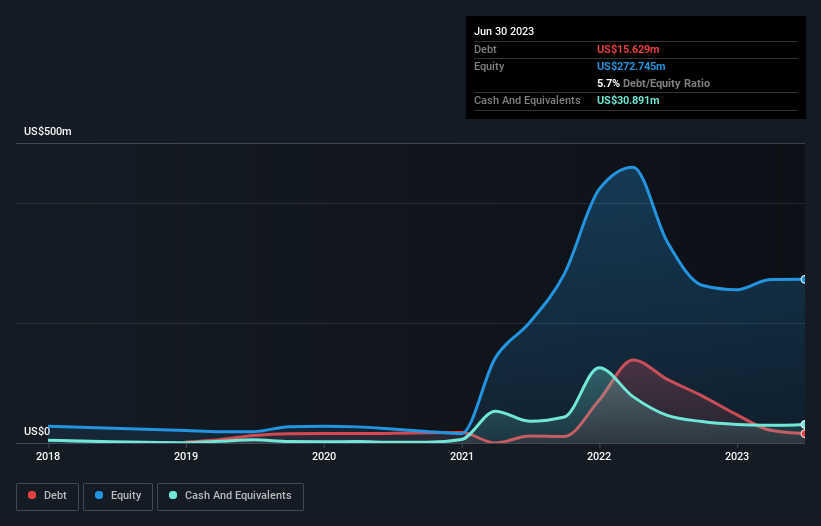Legendary fund manager Li Lu (who Charlie Munger backed) once said, 'The biggest investment risk is not the volatility of prices, but whether you will suffer a permanent loss of capital.' So it might be obvious that you need to consider debt, when you think about how risky any given stock is, because too much debt can sink a company. As with many other companies Bitfarms Ltd. (TSE:BITF) makes use of debt. But is this debt a concern to shareholders?
When Is Debt A Problem?
Debt is a tool to help businesses grow, but if a business is incapable of paying off its lenders, then it exists at their mercy. Part and parcel of capitalism is the process of 'creative destruction' where failed businesses are mercilessly liquidated by their bankers. While that is not too common, we often do see indebted companies permanently diluting shareholders because lenders force them to raise capital at a distressed price. Of course, debt can be an important tool in businesses, particularly capital heavy businesses. The first step when considering a company's debt levels is to consider its cash and debt together.
See our latest analysis for Bitfarms
What Is Bitfarms's Net Debt?
The image below, which you can click on for greater detail, shows that Bitfarms had debt of US$15.6m at the end of June 2023, a reduction from US$106.0m over a year. However, its balance sheet shows it holds US$30.9m in cash, so it actually has US$15.3m net cash.

A Look At Bitfarms' Liabilities
The latest balance sheet data shows that Bitfarms had liabilities of US$37.4m due within a year, and liabilities of US$15.5m falling due after that. Offsetting this, it had US$30.9m in cash and US$19.4m in receivables that were due within 12 months. So it has liabilities totalling US$2.63m more than its cash and near-term receivables, combined.
Having regard to Bitfarms' size, it seems that its liquid assets are well balanced with its total liabilities. So while it's hard to imagine that the US$356.5m company is struggling for cash, we still think it's worth monitoring its balance sheet. Despite its noteworthy liabilities, Bitfarms boasts net cash, so it's fair to say it does not have a heavy debt load! The balance sheet is clearly the area to focus on when you are analysing debt. But ultimately the future profitability of the business will decide if Bitfarms can strengthen its balance sheet over time. So if you're focused on the future you can check out this free report showing analyst profit forecasts.
Over 12 months, Bitfarms made a loss at the EBIT level, and saw its revenue drop to US$126m, which is a fall of 33%. That makes us nervous, to say the least.
So How Risky Is Bitfarms?
We have no doubt that loss making companies are, in general, riskier than profitable ones. And in the last year Bitfarms had an earnings before interest and tax (EBIT) loss, truth be told. And over the same period it saw negative free cash outflow of US$38m and booked a US$130m accounting loss. With only US$15.3m on the balance sheet, it would appear that its going to need to raise capital again soon. Summing up, we're a little skeptical of this one, as it seems fairly risky in the absence of free cashflow. There's no doubt that we learn most about debt from the balance sheet. But ultimately, every company can contain risks that exist outside of the balance sheet. We've identified 3 warning signs with Bitfarms , and understanding them should be part of your investment process.
If, after all that, you're more interested in a fast growing company with a rock-solid balance sheet, then check out our list of net cash growth stocks without delay.
Valuation is complex, but we're here to simplify it.
Discover if Bitfarms might be undervalued or overvalued with our detailed analysis, featuring fair value estimates, potential risks, dividends, insider trades, and its financial condition.
Access Free AnalysisHave feedback on this article? Concerned about the content? Get in touch with us directly. Alternatively, email editorial-team (at) simplywallst.com.
This article by Simply Wall St is general in nature. We provide commentary based on historical data and analyst forecasts only using an unbiased methodology and our articles are not intended to be financial advice. It does not constitute a recommendation to buy or sell any stock, and does not take account of your objectives, or your financial situation. We aim to bring you long-term focused analysis driven by fundamental data. Note that our analysis may not factor in the latest price-sensitive company announcements or qualitative material. Simply Wall St has no position in any stocks mentioned.
About TSX:BITF
Bitfarms
Operates integrated bitcoin data centers in Canada, the United States, Paraguay, and Argentina.
High growth potential with adequate balance sheet.
Similar Companies
Market Insights
Weekly Picks

Early mover in a fast growing industry. Likely to experience share price volatility as they scale


A case for CA$31.80 (undiluted), aka 8,616% upside from CA$0.37 (an 86 bagger!).


Moderation and Stabilisation: HOLD: Fair Price based on a 4-year Cycle is $12.08
Recently Updated Narratives

Micron Technology will experience a robust 16.5% revenue growth

Amazon will rebound as AI investments start paying off by late 2026


Inside Harvey Norman: Asset-Heavy Retail in an Online World
Popular Narratives


A case for CA$31.80 (undiluted), aka 8,616% upside from CA$0.37 (an 86 bagger!).

Early mover in a fast growing industry. Likely to experience share price volatility as they scale


NVDA: Expanding AI Demand Will Drive Major Data Center Investments Through 2026
Trending Discussion



